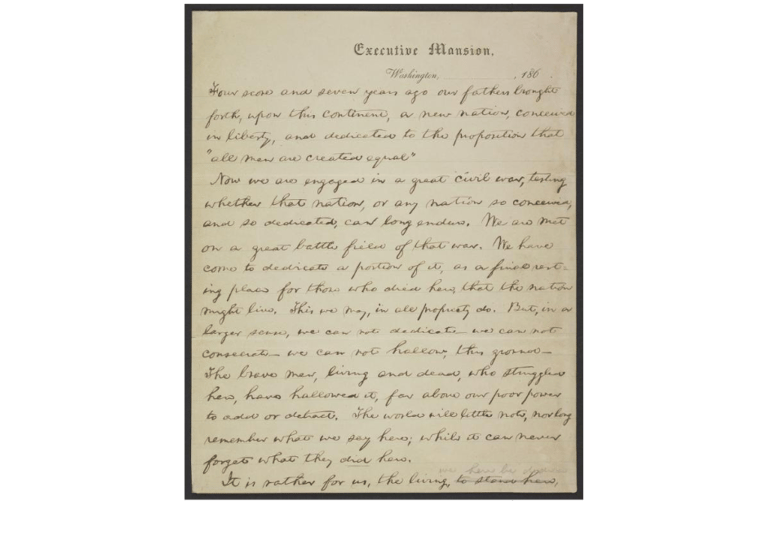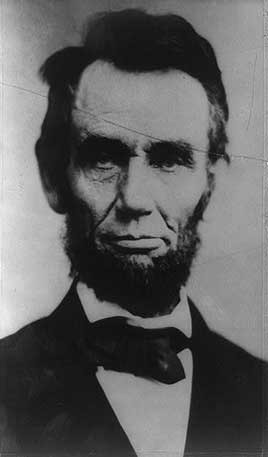What is Plagiarism? How Can I Avoid It?
It's really quite easy to avoid plagiarism. Use your own brain. Give credit to other people for their ideas. Put their words inside quotation marks. But it can still be confusing to know what exactly constitutes plagiarism. The best way to understand it is via examples. This post includes examples of plagiarized versions of Lincoln's Gettysburg Address.
11/11/20186 min read


Before I define plagiarism, let me get this out of the way: passing off AI-generated text as your own is a form of plagiarism, and is patently WRONG and DISHONEST. Plus, it makes your brain lazy and dumb. (More on this topic later!)
But let's get back to the question: What is plagiarism? I discuss this at length with my writing students, because many have been taught incorrectly or not at all. It’s NOT ENOUGH to change a few words around, or to re-order sentences. Even if most of the words are different, plagiarism exists if the rhythm and the essential order of similar thoughts remains the same. I tell my students to set the source text out of sight, then tell what the original is about, as though talking with a friend. They must then double-check to make sure that they have not accidentally included a phrase or two that they unconsciously memorized. If the original wording is exceptional and powerfully phrased, then they can use direct quotations and identify the source.
Plagiarism is best understood by looking at examples. Below is the last paragraph of one of the most well-known speeches in American history, followed by examples of plagiarized versions. This is the last paragraph of Abraham Lincoln’s Gettysburg Address:
But, in a larger sense, we cannot dedicate—we cannot consecrate—we cannot hallow—this ground. The brave men, living and dead, who struggled here, have consecrated it, far above our poor power to add or detract. The world will little note, nor long remember what we say here, but it can never forget what they did here. It is for us the living, rather, to be dedicated here to the unfinished work which they who fought here have thus far so nobly advanced. It is rather for us to be here dedicated to the great task remaining before us—that from these honored dead we take increased devotion to that cause for which they gave the last full measure of devotion—that we here highly resolve that these dead shall not have died in vain—that this nation, under God, shall have a new birth of freedom—and that government of the people, by the people, for the people, shall not perish from the earth.
This version is plagiarized. Although a few of the words (highlighted in gray) have been changed, it is very much a replica of the original paragraph, with no original phrasing or thought:
But, in a meaningful sense, we cannot dedicate—we cannot consecrate—we cannot bless—this ground. The brave men, living and dead, who fought here, have consecrated this land, far above our poor ability to add or detract. The world will little notice, and will not remember long what we say here, but it can never forget what they did here. It is for us the living, instead, to be dedicated here to the incomplete work which they who struggled here have thus far so nobly accomplished. It is rather for us to be here resolved to carry on the great task remaining before us—that from these honored dead we take increased resolve to that cause for which they gave the last full measure of devotion—that we here promise that these dead shall not have died in vain—that this country, dedicated to God, shall have a new birth—and that government of the populace, by the populace, for the populace, shall not disappear from the earth.
This version is still plagiarized, although more of the words have been changed. The essential word order and meaning have been mimicked throughout:
In a larger sense, we cannot dedicate or consecrate this ground because the brave men who lived and died here have consecrated it, far above what we could do. The world will forget what we do here, but it can never forget what they accomplished here. So those of us who still breathe and live must be dedicated to the work they did not complete. It is for us to carry on the great work that lies before us—that on behalf of these honored dead we recommit to that cause for which they gave their lives—that they shall not have died for nothing—that our country, which is in God’s hands, shall begin anew—and that the government of, by, and for the people, shall never cease to exist.
This version is STILL plagiarized! While more has been changed, the essential order is the same, and key phrases have been parroted without giving credit to the original:
You might say that this ground cannot be dedicated by us, because the brave men who laid down their lives here have already dedicated it with their blood. Our words will be forgotten, but their actions will never be forgotten. So it is for those of us still living to carry on their unfinished work. We must commit ourselves to what remains still to do. From them, we take increased devotion to the cause they died for. Thus, they will not have died in vain, and this nation—with God as our witness—will rise once more with freedom in her wings, ensuring that our democracy shall not perish from the land.
And here we have still MORE plagiarism! Even though the topic is different and only one phrase from Lincoln’s speech is used, it is not attributed to him. The lifted phrase is unique enough in its wording and impact that it is recognizable as Lincoln’s.
I am honored today to speak at this graduation. Most of you are a lot more accomplished and interesting than I will ever be! So my talk today isn’t about me; it is about you. The world will not long remember what I say here, but it can never forget what you did here.
Although the Gettysburg Address is in the public domain (meaning that it can be used, in full, at no charge), copying from it is plagiarism. So is copying directly from Plato or Josephus or anyone else. To do so is to take credit for something you did not think of yourself. Which is dishonest.
Now let’s look at some examples of how to echo Lincoln’s address without plagiarizing it. This is an example of an acceptable paraphrase of Lincoln’s words. Note that attribution is made to Lincoln as the source of the ideas:
Abraham Lincoln said that the graves he was about to dedicate had already been sanctified by those whose blood was spilled there. He could do nothing more as a speaker or president than what they had already done, in giving their lives for the preservation of their country. He said that while his words would soon be forgotten, their actions would not be. Their deaths, therefore, would serve some greater purpose, by inspiring others to safeguard the freedoms and the democracy that they died defending.
This is an example of correctly using direct quotations from the Lincoln’s address, while also paraphrasing parts of it. A supporting statement is quoted from another writer as well:
Lincoln delivered his address at Gettysburg for the dedication of a cemetery at the site of the bloodiest battle of the Civil War, where over 50,000 men were killed or wounded on both sides. Rather than mumbling a few platitudes over the graves, he delivered a speech that has resounded through history as a defense of American democracy and human freedom. In the last paragraph, he emphasized that the cemetery at Gettysburg could not be dedicated, or “consecrated,” or “hallowed,” beyond what the men did who “struggled” there. Instead, he said, we best honor them and the ground on which they died, by carrying on their “unfinished work.” What was this work? The preservation of freedom for all. The determination to preserve a nation, “under God,” with a government “of the people, by the people, for the people.” To ensure that such a nation and such a government “shall not perish from the earth.” According to the writer Garry Wills, in Lincoln’s brief address at Gettysburg, “The power of words has rarely been given a more compelling demonstration.”
So now you know. It's easy to avoid plagiarism if you name the person you got ideas from, AND use your own words and thoughts unless you put your source's words in quotation marks.


